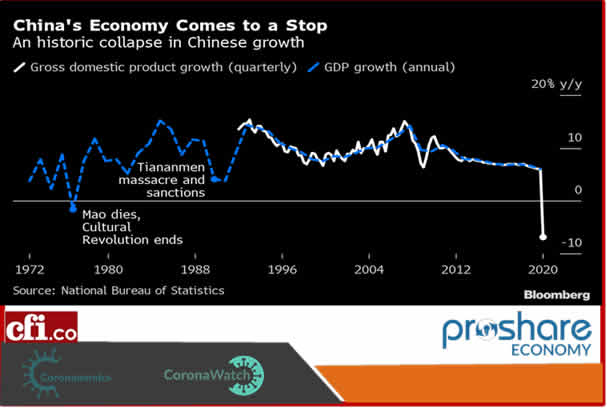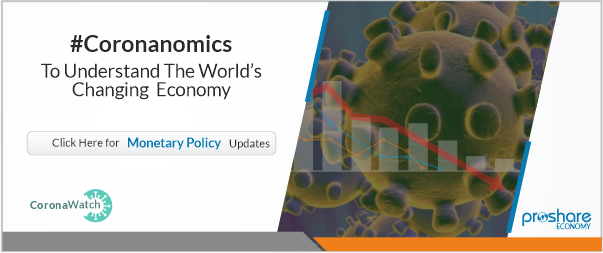Sunday, April 19, 2020 / 12.57PM / By CapitalFinance International / Header Image Credit: Bloomberg
For the first time innearly half a century China's economy has stopped growing. The National Bureauof Statistics (NBS) reported a 6.8 percent drop in economic output over thefirst quarter of the year. Retail sales were down by 19 percent and exportsales shrank by 13 percent. Fixed asset investment is down as well whilstunemployment jumped to 5.9 percent.
Though the Chinese NBS data usually require a pinch of salt, there islittle doubt that the Chinese economy took a severe hit from the pandemic.However, in its World Economic Outlook, published earlier thisweek, the International Monetary Fund (IMF) predicts China to bounce backquickly and end the year on a positive note with GDP expanding by a modest 1.2percent. IMF forecasters expect the country to get its mojo back into workingorder next year when the economy may grow by as much as 9.2 percent.
Though the IMF's outlook is peppered with caveats, the fund clearlycontinues to view China as the main driver of global growth. As far as the IMFis concerned, a serious re-evaluation of globalisation is not in the cards. Itis, of course, not the fund's job to consider the political landscape as itanalyses economic performance and distils trends from numbers. In fact, the IMFenjoys somewhat of a reputation when it comes to steamrolling over the concernsof politicians, reminding them that nations must, as a rule, live within theirmeans.
Whilst the advice the institution dispenses is usually quite sound andsensible, the fund - by its own admittance - never before had to deal with aglobal recession of a magnitude comparable to the present crisis which struckwith a speed and ferocity not seen before in living memory. The pandemic hasmaterially changed political reality, resulting in a paradigm shift in ourcollective understanding of economic theory. The spread of a microscopicallysmall virus has exposed the fragility of the very system that has generatedconsiderable wealth.
Over the past 40 odd years, globalisation has lifted billions out ofpoverty in Asia, Africa, and elsewhere. By leveraging the comparativeadvantages of nations, as first codified by the British political economistDavid Ricardo at the start of the 19th century, the world entered anera of almost continued economic growth, interrupted only by relatively smallhiccups as dynamic markets corrected distortions and eliminated pockets ofinefficiency.
China's economic contraction, however brief, may be dismissed asatypical since it was caused by an unexpected externality and not by some majorflaw of the country's development model. That model has yielded extraordinaryresults. In 1976, the year Chairman Mao passed away, the country boasted a percapita income of $167 - one of the world's lowest. After the CulturalRevolution had been derailed with the arrest of the Gang of Four, Chinaembraced the Four Modernisations first proposed in 1963 by Zhou Enlai, thenvice-chairman of the Communist Party, and implemented by the great reformerDeng Xiaoping in 1977. What happened next constitutes a miracle of sorts. Fastforward 43 years, the blink of an eye in the course of human history, and Chinapresides over the world's second largest economy with a per capita income closeto $10,000.
The almost mind-boggling progress of the country took everyone bysurprise. It had been deemed impossible. In 1988, Milton Friedman, the dean ofeconomic liberalism, proclaimed that China could not possibly hope to attainany significant measure of prosperity since it lacked the requisite politicalfreedom that underpins capitalism. "To get rich, China must be free," surmisedthe late professor of the University of Chicago who counted US President RonaldReagan and UK Prime Minister Margaret Thatcher amongst his disciples.
In fact, Prof Friedman gave this advice to General Secretary of theCommunist Party Zhao Ziyang whilst on a visit to Beijing at the invitation ofChinese top officials eager to discover the wonders of capitalism. However, MrZiyang did not at all like what he heard from the US professor. After he hadleft, China rewrote the textbook and chose its own path to riches - disassembling long-held theories about the crucial link between free marketsand democracy as it rapidly emerged from poverty.
The pandemic currently holding economies hostage all over the world alsoforces a rewrite of the economic cookbook. As China has proved, that need notstall growth. In Europe, and even in the United States, the primacy of themarket is being questioned. Thanks to a senator from Vermont, young Americanshave discovered that unbridled capitalism is not the only choice of offer. Asif an entire generation suffered an epiphany, interest in social democracy hasbeen sparked. Though this may not lead to immediate demise of the mastodons ofthe political establishment, the epithet 'card-carrying liberal' no longerrepresents instant dismissal as a swivel-eyed loon belonging to a curiousfringe movement.
In Europe, even staunch liberals such as Dutch Prime Minister Mark Ruttenow seem to take pride in their social democratic roots. During a debate inparliament, Mr Rutte caused consternation amongst friends and foes alike bycalling the country 'socialist' and considering that trait a blessing in thesetroubled times. Across the continent, political and economic thinkers quietlyadvocate for a return to wealth creation by all as opposed to wealth extractionby a few. The very premises of globalisation and the teachings of David Ricardoare being questioned as are the concepts of small government, deregulation, andprivatisation.
Writing in The New York Times, former US Secretary of the TreasuryRobert Rubin, who served in both Clinton administrations, now pleads for amassive and structural increase in federal spending. He argues that there isample room for extra outlays of cash given that the federal budget representsonly some 16 percent of GDP. That may easily be increased to 20 percent ormore, he says. Mr Rubin also warns that any savings made now will prove to havebeen false later on. Allowing the US economy to languish in a long-tailedrecession results in a lower GDP, taking a bite out of federal revenue, andpushing the debt-to-GDP ratio up considerably. Mr Rubin argues that it is wiserto put the horse in front of the cart and issue vast amounts of new debt tokeep the economy going.
For all its uncertainties, the post-corona world will want to revisitpreviously discarded concepts such as economic resilience. Supply chains willbe shortened as societies awake to the dangers of depending on distant othersfor their security. This is bad news for China and a few others withtrade-based growth models such as Germany and The Netherlands. In the mediumterm, China will need to spur domestic demand which remained repressed to asignificant degree whilst the country sought to exploit its comparativeadvantage as a low wage nation. In northern Europe too, wages and itscorresponding domestic demand have been kept artificially low as part of a mixof policies to ensure relative competitiveness.
As the pandemic continues to ravage economies, and the direct andindirect costs of the outbreak mount, individuals and businesses alike willclamour for ever greater measures of support from the only entity able toprovide the level of succour needed - the state.
After the virus has been contained, that state will look, feel, and behavedifferently than before. It will also enjoy a much greater level ofappreciation than before.
That may either open a can of worms or lead to a more benign form ofcapitalism and a renewed interest in social democracy which, although muchmaligned, did manage to rebuild a continent shot to smithereens by a world war.Not only that, it did so at a clip comparable to China's speeding down the roadfrom rags to riches.
End.
Related News -
1. SDG Lab at UNGeneva: Delivering the 2030 Agenda in Decade of Action Will Call forCo-operation
2. Debt ReliefNeeded to Preserve 30 Years of Progress
3. Sub-SaharanAfrican Growth Projected At -1.6% in 2020 - IMF
4. SpringMeetings for Funds to Fight off the COVID-19 Virus - FBNQuest
5. WEO: GlobalEconomy is Projected to Contract By 3% in 2020 - IMF
6. World BankWarns African Countries Copying Western Anti-COVID-19 Policies
7. IMF ExecutiveBoard Approves a US$1bn Disbursement to Ghana to Address the COVID-19 Pandemic
8. IMF ExecutiveBoard Approves Immediate Debt Relief for 25 Countries
9. The AfDB andIts Partners Want Your Ideas for Beating the COVID-19 Pandemic
10. World BankReadies $160bn Emergency Aid Package
11. African DevelopmentBank Group Unveils $10bn Response Facility to Curb COVID-19
12. Statement byIMF Managing Director Kristalina Georgieva on Nigeria
13. The PandemicIs No Time for Fiscal Distancing - Adesina
Related News -
1. What To Expect From The Markets ThisWeek - 200420
2. Consolationin Isolation: COVID-19 - Why You Are Unlikely to Die - LBS EBS - April 2020
3. The WorldAfter COVID-19: Mark Carney on How The Economy Must Yield to Human Values
4. GreatLockdown Necessitates Further Downgrade to GDP
5. COVID-19 andthe Focus on Sub-Nationals in Nigeria
6. Reset Nigeria- A New Paradigm For Africa's Most Populous Country
7. Decline inthe FGN's External Debt Service
8. COVID-19:Impact on Supply Chain and Disruptions on Operating Model
9. NigeriaWeekly Update: Oil Prices, the New Normal
10. Job SecurityDuring and Post COVID-19
11. Back toOfficial Creditors for New Borrowing
12. COVID-19: ThePathway For The Nigerian Economy
13. Nigeria Needsto Generate Liquidity To Ensure Growth and Stability - Dr. Ayo Teriba
14. InvestmentClusters Needed To Support Nigeria's Post COVID-19 Development - Omofaye
15. COVID-19:Short-Term Measures Have Long-Term Economic Impacts
Related News -
- CBN Intervention: Playing to the Gallery or Serious Business?
- Turning COVID-19 Tragedy into Opportunity for a New Nigeria
- Personal Statements By The MPC Members At The 129 MPC Meeting of Mar 23-24, 2020
- MPC - Think Twice or You Sink! FDC Aligns with TheAnalyst Opinion that the CBN is Trapped
- CBN Issues Guidelines for the Implementation of the N50bn Targeted Credit Facility
- CBN Communique No. 129 of the MPC Meeting - Mar 23-24, 2020
- The Limits of Heteredox Economics Revealed, MPC Trapped and Has to Hold
- Monetary Policy Preview - Caught Between the Devil and the Deep Blue Sea
- Fiscal or Monetary, Both, Neither?
- COVID-19: CBN, Bankers' Committee to Support Pharmaceutical Companies
- Bankers Committee Reviews Impact of COVID-19 On Economy, Announces Support Packages
- Coronanomics: Figuring Out CBN's Recent Policy Intervention
- CBN Policy Measures in Response to COVID-19 Outbreak and Spillovers
- Bank of England Measures to Respond to The Economic Shock from COVID-19
Related News -
- It's Time to Build - OpEd
- What Would the World Look Like after Coronavirus: Economically, Politically and Socially?
- Repositioning for Relevance in a Competitive Environment
- Nigeria's Unconventional Policies Aggravate External Vulnerability
- Negative Yields Do Not Necessarily Support Sovereign Credit
- No Deal Brexit Threat Shifts Priorities For Autos Investment
- Lies, Damned Lies and Statistics: How to Make Sense of FDI Data
- Nigerian Banking Sector Recovery Still Hampered by Bad Loans
- Loan-to-Deposit Requirement Credit-Negative for Nigerian Banks
- US-China Trade War Escalation Could Knock 0.4pp Off World GDP by 2020
Related News - GlobalMarkets
1. COVID-19 andthe SSA Region: Entering a Period of Negative Growth
2. CoronavirusAnd The Coming Financial Revolution
4. COVID-19:Developments In the Global Markets and The Impact On Nigeria
5. UnemploymentPeaks in Lockdown Will be Extreme
6. Mapping theCOVID-19 Global Recession - OpEd
7. BIS: TheMacroeconomic Spillover Effects of the Pandemic on the Global Economy
8. UK BanksAgree to Scrap 8bn Euros Dividends Amid Recession Fears
9. Coronavirusto Weaken Eurozone Fiscal Positions amid Recession
10. External DebtRelief: A Ray of Sunshine for African Economies
11. 39% of APACCorporates More Exposed to Coronavirus
12. COVID-19:Measures Taken by UK Government to Support Business
13. The FederalReserves is Running Out of Options to Stave Off a Coronavirus Depression
14. CoronavirusCrisis Is Crushing Global GDP Growth
15. COVID-19Outbreak: How is Africa faring?
16. Fed Actions,US Banks Discount Window Use Prudent Amid Turmoil
17. There Is NoSystemic Risk - Feedback from GoldmanSachs' Conference Call Held Sunday
18. CoronavirusContainment Actions Pose Material Risk to Global Structured Finance
19. FederalReserve Cut Rates to Support the Flow of Credit to Households and Businesses
20. Africa'sEconomy and Coronavirus: Business as usual?
Related News -
1. Moody'sAffirms Nigeria's B2 Ratings, Maintains Negative Outlook
2. Fitch RevisesOutlook on Kaduna State to Negative on Sovereign Rating Action; Affirms at 'B'
3. FitchDowngrades Lagos State to 'B' on Sovereign Rating Action; Outlook Negative
4. FurtherMulti-Notch Sovereign Downgrades Are Probable in 2020
5. VariousRating Actions On Nigerian Banks By S and P Following Sovereign Downgrade;Outlooks Stable
6. Three RatingsAgencies, Now One Message
7. FitchDowngrades Nigeria to 'B'; Outlook Negative
8. NigerianBanks at Severe Risk from Oil Price Slump, Coronavirus
9. Moody'sAssigns Ratings to Dangote Cement Plc's DMTN Program and Proposed Series 1Notes
10. MacroeconomicReview Q1 2020: Steering a Fragile Economy in the Face of Uncertainties
11. FitchDowngrades 3 Nigerian Banks to 'B', Places All 10 Banks on Negative Watch
12. NigeriaLong-Term Rating Lowered To ''B-'' On Weakening External Position
13. Coronavirusto Weaken Sovereign Fiscal Positions; Track Record Matters
14. Fiscal SpaceLimited for Many Sovereigns
 Lagos, NG • GMT +1
Lagos, NG • GMT +1











 1977 views
1977 views
















 Sponsored Ad
Sponsored Ad
 Advertise with Us
Advertise with Us









